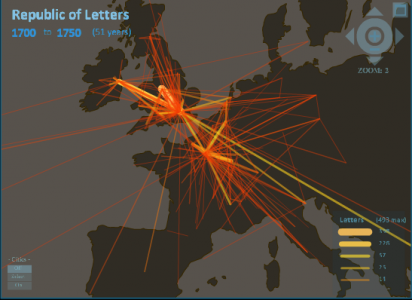Is Data the New Black?

On the heels of Patricia Cohen's buzz-generating August piece discussing recent experiments in web-based "open" review systems, the New York Times published on Tuesday the first feature in a series of articles that will explore the ways in which digital technologies are changing scholarship in literature, history, and the arts.
Tuesday's piece, also written by Cohen, opens with the thesis that the next big idea in the humanities is data--or more precisely, large-scale data mining. This turn manages to be at once oddly banal, on the one hand, in that the intellectual vanguard is finally beginning to make use in its research of technologies that many of its members have likely been using on Amazon and Google for years, and on the other hand, the "data" turn is momentous in that it just might be indicative of a decisive shift in the way humanists will approach their work in the next decade. In other words, Cohen's investigation of the idea and applications of the new "digital humanities" suggests that the we're either on the cusp of a real revolution or we're not. And it just might be too early to say.
The NYT piece brims with enough interesting projects to make the case that the digital humanities movement--a humanities 2.0, of sorts--will be more than just a techno-academic fad and might, in fact, usher in a new era of scholarly collaboration using vast digital collections to produce bracing new ideas and fresh approaches to old ones. Consider Prof. Dan Edelstein's (Stanford) collaborative GIS mapping project tracing the flow of Enlightenment ideas by the trajectory of letters between the movement's major figures. The creativity behind such an enterprise is undeniable and healthy, but Edelstien himself acknowledges that some of his colleagues consider his efforts to be technological play rather than the old fashioned heavy lifting of traditional archival work.
Cohen gives such criticisms a worthy articulation in quoting Princeton historian Anthony Grafton: "It's easy to forget the digital media are means and not ends." And this, coming from a partisan of digital scholarship.
Grafton's point is that the wizardry of digital tools doesn't (and shouldn't) obviate the need for the traditional humanist's work of painstaking interpretation, but some of the other scholars Cohen speaks with seem to be suggesting something that approaches the opposite. Tom Scheinfeldt, managing director of the Center for History and New Media at George Mason University, appears to tell Cohen that the humanities are moving into a "methodological moment" or alternately, a "post-theoretical" age. Implicit in all of this seems to be a condemnation of the theory wars, the 20th century's parade of what Cohen refers to as the "'isms' — formalism, Freudianism, structuralism, postcolonialism — grand intellectual cathedrals from which assorted interpretations of literature, politics and culture spread."
The idea that technically-savvy, digitally-enabled, and method-driven scholarship is somehow atheorical or "post-theoretical" strikes this writer, for one, as more than a little dubious, but that by no means discredits the digital humanists' argument for embracing and exploring the analytical possibilities of new tools. Pandora's box of critical theory was opened a long time ago, and but that needn't be a bad thing here or everafter. Why not follow Grafton and bring the theoretically informed, critical interpretation that has long been the humanist's great strength to the project of analyzing the new wealth of material that the "data" turn promises?